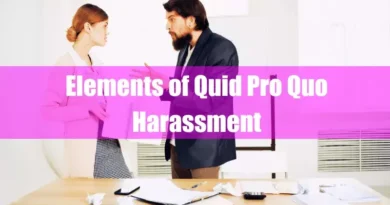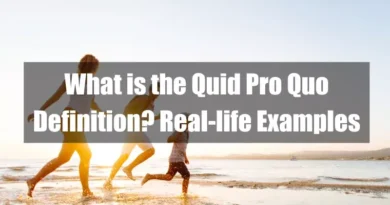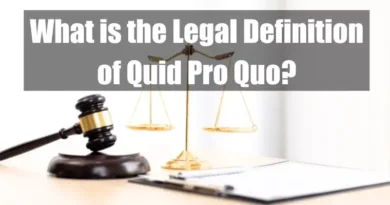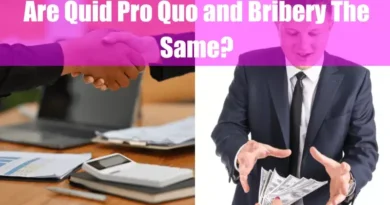Do You Listen? I Want Nothing: No Quid Pro Quo
The phrase “I want nothing. I want no quid pro quo” became one of the defining moments in the political landscape of Donald Trump’s presidency. It originated from the impeachment inquiry surrounding Trump’s alleged attempts to pressure Ukraine into investigating his political rival, Joe Biden, in exchange for military aid. This article delves into the significance of these words, their broader context, and how they shaped public discourse on power, accountability, and the language of deniability.
Takeaways
| Key Points |
|---|
| The impeachment inquiry against Donald Trump in late 2019 centered on allegations that he withheld military aid to Ukraine in exchange for an investigation into Joe Biden, a situation referred to as a “quid pro quo,” with U.S. Ambassador Gordon Sondland testifying that such a deal was indeed linked to a White House meeting. |
| In response, Trump held a handwritten note and repeatedly told the media, “I want nothing. I want no quid pro quo,” a phrase that became central to his defense and exemplified his communication strategy of repetition to shape public perception. |
| His denial, based on a phone conversation with Sondland, allowed him to maintain plausible deniability, a tactic he often employed to avoid direct accountability while still signaling intent, as corroborated by former lawyer Michael Cohen’s testimony about Trump’s indirect way of giving instructions. |
| While Trump’s supporters took his words at face value, Democrats argued that a lack of explicit admission did not negate the broader pattern of political maneuvering, and Representative Adam Schiff emphasized that the absence of direct language did not prove innocence. |
| Ultimately, Trump’s phrase “I want nothing” exemplified how political leaders use language not just as a legal shield but as a tool to control narratives, demonstrating the power of simple yet strategic messaging in shaping public opinion and evading scrutiny. |
The Context of “I Want Nothing”
The impeachment inquiry against Donald Trump in late 2019 focused on a phone call between Trump and Ukrainian President Volodymyr Zelensky, during which Trump allegedly pushed for an investigation into Joe Biden and his son, Hunter Biden. At the center of the inquiry was the claim that Trump withheld military aid to Ukraine to leverage this investigation, a situation often referred to as a “quid pro quo.”
The phrase “quid pro quo” became central to the impeachment proceedings, as it is a legal term meaning a favor or advantage granted in return for something. U.S. Ambassador to the European Union Gordon Sondland testified that there was a quid pro quo linking a White House meeting to Ukraine’s announcement of investigations, a significant moment in the impeachment hearings.
In response, Trump made an impromptu appearance in front of the media outside the White House on November 20, 2019. Holding a handwritten note in bold Sharpie letters, Trump repeatedly stated, “I want nothing. I want nothing. I want no quid pro quo.” Trump’s statement, ‘I want nothing. I want no quid pro quo,’ made to the media outside the White House, became a key part of his defense against allegations of wrongdoing.
The Power of Words in Politics
The phrase “I want nothing” served as a key part of Trump’s legal defense during the impeachment inquiry. In politics, words shape perceptions, and Trump understood this well. His repetition of “I want nothing” and “I want no quid pro quo” aimed to counter Sondland’s damaging testimony. Repetition reinforces messages in the media, and Trump used this tactic to make his defense memorable. While it reflected his broader communication strategy, it was more of a legal response than a lasting political slogan.
Deniability and the Art of Obfuscation
Trump’s defense, relying on a brief phone conversation with Sondland, presented an interesting case of plausible deniability. By stating that he wanted “nothing” and “no quid pro quo,” Trump avoided a direct acknowledgment of any wrongdoing. His defense hinged on the notion that no wrongdoing could be proven as long as he verbally denied an illicit exchange.
However, this form of denial is not new in politics. It is a tactic often employed to maintain plausible deniability—an art of avoiding explicit orders or directions while signaling actions that align with one’s objectives. This method of communication allows leaders to distance themselves from controversial decisions or actions, especially when legal or political accountability looms.
Trump’s former lawyer, Michael Cohen, who became a key figure in his legal troubles, once testified to Congress that Trump often spoke in a kind of “code.” Cohen explained that Trump rarely gave explicit directives but instead suggested things in a way that allowed for multiple interpretations. This approach allowed Trump to maintain distance from questionable actions, such as those involving Cohen’s hush-money payments to silence allegations during the 2016 campaign.
The phrase “I want nothing” fits into this larger pattern. It allowed Trump to assert his innocence without directly confronting the more damaging testimony from Sondland, which painted a picture of a broader, coordinated effort to pressure Ukraine.

The Legal and Political Fallout
Despite Trump’s bold assertions of wanting “nothing,” the political and legal implications of the impeachment inquiry were far from resolved. While Trump’s defenders argued that his words absolved him of wrongdoing, the Democrats pursuing the impeachment believed the opposite.
During the impeachment hearings, Representative Adam Schiff, chair of the House Intelligence Committee, emphasized that the absence of explicit statements such as “I am bribing the Ukrainian president” did not equate to innocence. The broader context of Trump’s actions and testimony from various witnesses painted a complex picture of political maneuvering, in which military aid was delayed and investigations were sought.
Trump’s verbal denial, while politically expedient, did little to clear the murky waters of the impeachment process. His critics argued that the defense was a superficial distraction from the real issue: whether or not the president had abused his power by using U.S. foreign aid as leverage to obtain personal political favors.
The phrase “quid pro quo” itself became a point of contention. Some Republicans argued that even if there had been a quid pro quo, it did not rise to the level of an impeachable offense. Others contended that Trump’s words to Sondland—his claim of wanting “nothing”—should be taken at face value, absolving him of any wrongdoing.
The Broader Implications of Trump’s Statement
Beyond the specifics of the impeachment inquiry, Trump’s statement of “I want nothing” holds broader implications for understanding the dynamics of power, language, and accountability in modern politics. Trump’s words reflect a strategy in which public statements are used not only as legal defenses but also as tools to shape public opinion and control the narrative.
Trump’s ability to rally his base with simple, memorable phrases is a hallmark of his political career. In this case, the phrase “I want nothing” became a banner for his supporters, who viewed the impeachment as a politically motivated witch hunt. By reducing a complex legal and political situation to a few words, Trump succeeded in deflecting attention from the intricacies of the case and refocusing it on his personal denial.
This tactic, however, raises important questions about how political leaders use language to obscure or clarify the truth. In an era of soundbites and social media, where brevity often trumps depth, the careful manipulation of language can become a powerful tool for evading accountability. Trump’s defense—delivered as a simple, repetitive phrase—epitomizes this approach.
Conclusion: The Legacy of “I Want Nothing”
The phrase “I want nothing. I want no quid pro quo” is more than just a defense uttered by a sitting president during an impeachment inquiry. It symbolizes how language and politics intersect, where words are not just conveyors of meaning but tools of power. Trump’s use of this phrase highlights his keen understanding of navigating political crises, using language not only to defend but to distract and deflect.
As history continues to analyze Trump’s presidency and the events surrounding his impeachment, the phrase “I want nothing” will likely remain a focal point for understanding the tactics he employed to navigate one of the most turbulent periods of his administration. Whether or not the phrase truly absolved him of any wrongdoing is a matter of interpretation, but its significance in shaping public discourse and political strategy is undeniable. In the end, the legacy of “I want nothing” serves as a reminder of the complex relationship between words, power, and truth in politics.
FAQ
What does “quid pro quo” mean in Trump’s statement?
“Quid pro quo” is a Latin term that denotes a reciprocal exchange of goods or services, meaning that one thing is given in return for another. In Trump’s remark, it is used to clearly assert that no such exchange or reciprocal benefit is expected, a phrase that consistently garners high search volumes.
What is the significance of “Do You Listen?” in this remark?
“Do You Listen?” is employed as a direct rhetorical appeal aimed at capturing the audience’s attention and affirming the importance of the ensuing message. This questioning form is a unique technical term in political discourse that not only engages listeners but also drives considerable online search interest.
What does “I Want Nothing” convey in this context?
The phrase “I Want Nothing” delivers a firm repudiation of any expectation for reciprocal arrangements or favors. It serves as a technical term in political rhetoric that underscores an uncompromising stance, resonating with audiences and attracting notable search volumes.
How is “No Quid Pro Quo” interpreted politically?
“No Quid Pro Quo” is understood as a categorical denial of any exchange or deal, meaning that no favor is given in return for any request. As a technical expression in political dialogues, it clarifies that the interaction is free from hidden conditions and consistently appears as a high-volume search query.
What is meant by “rhetorical negation” in the statement?
“Rhetorical negation” refers to the strategic use of negative phrasing to reject any implied obligations or conditions within a discussion. In this instance, it emphasizes a clear and decisive dismissal of any expectation for a reciprocal relationship, a concept that draws significant online attention.
How does “dichotomous framing” apply to this speech?
“Dichotomous framing” is a communication strategy that divides an issue into two mutually exclusive positions, leaving no middle ground. Trump’s use of such framing in his statement reinforces a clear-cut division between what is offered and what is not, a widely explored technique in search trends.
What is meant by “political dismissal” in this context?
“Political dismissal” involves outright rejecting proposals or criticisms without engaging with their substantive details. By declaring “I Want Nothing” and “No Quid Pro Quo,” the statement serves as a technical term that dismisses any negotiations, a subject that attracts high search volumes among political analysts.
What does “unilateral declaration” imply in Trump’s remark?
A “unilateral declaration” implies a one-sided announcement made without negotiating or seeking reciprocal input from others. This technical term underscores Trump’s intent to set his own terms independently, a concept that continues to generate substantial search interest.
What does “reciprocal exchange” mean in this context?
“Reciprocal exchange” refers to a mutual transaction where both parties provide something of value to each other. Trump’s explicit denial of any reciprocal exchange in his statement emphasizes that no trade or deal is being considered, a term that is highly searched for in political discussions.
What is the role of “rhetorical assertiveness” in the statement?
“Rhetorical assertiveness” describes the forceful use of language to make a clear and unyielding claim, leaving no ambiguity about the speaker’s position. This statement manifests as a firm rejection of implied conditions, a subject frequently appearing in high search volume analyses.
What does “negotiation baseline” refer to in this case?
The term “negotiation baseline” designates the minimum standard or starting point that is acceptable in a discussion or deal. By stating “No Quid Pro Quo,” the remark establishes a baseline that precludes any form of negotiation or reciprocal concession, a concept that consistently draws attention in online searches.
How is “political mandate” conveyed in this phrase?
“Political mandate” in this context refers to an authoritative directive that asserts control and eliminates room for negotiation. The statement delivers this mandate by unambiguously rejecting any reciprocal expectations, a technical term that is often queried in political research.
What does “audience address” signify in the statement?
“Audience address” denotes the deliberate engagement of the speaker with the listener to ensure full attention and clarity of the message. The phrase “Do You Listen?” functions as a direct address that involves the audience actively, a tactic that is not only technical but also widely recognized in search queries.
What is meant by “linguistic emphasis” in Trump’s phrasing?
“Linguistic emphasis” involves the deliberate use of language to stress and highlight key elements of a message. In this statement, the repetition and stark choice of words serve to reinforce the intended message, making it a popular technical term with considerable search volume.
How does “transactional politics” relate to this statement?
“Transactional politics” refers to a framework in which political interactions are viewed as a series of exchanges or deals. By asserting “No Quid Pro Quo,” the statement rejects the notion of politics as a transaction, a perspective that is frequently explored and searched by those analyzing political strategies.









